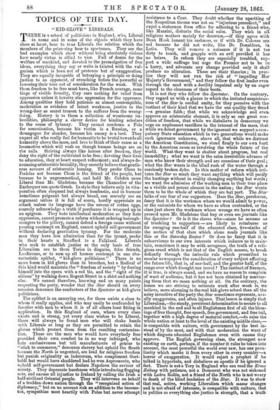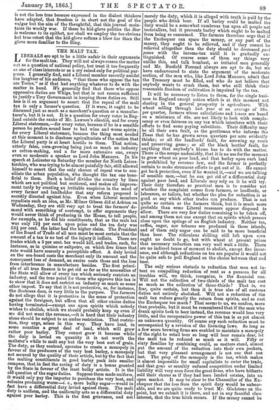TOPICS OF THE DAY.
" KID-GLOVE " LIBERALS. TFIERE is a school of politicians in England, who, Liberal in name and in some of the objects which they have close at heart, bear to true Liberals the relation which the members of the prize-ring bear to sportsmen. They are the bad examples which show without being absolutely vicious how nearly virtue is allied to vice. Full of desire for the welfare of mankind, and devoted to the promulgation of free ideas, everything they say or write is tainted with the vul- garism which is born not of pretence but of exaggeration. They are equally incapable of betraying a principle or doing justice to an opponent, of crouching before the powerful or lowering their tone out of consideration for the weak. With them freedom to be free must have, like French courage, some tinge of visible ferocity, they care nothing for relief from oppression unless it involve also oppression for the oppressor. Among qualities they hold patience as almost contemptible, moderation as evidence of latent weakness, justice to the wrong-doer as secret treason to the sufferer from the wrong- doing. History is to them a collection of wearisome im- becilities, philosophy a clever device for binding scholars to the cause of tyranny. They cannot condemn a Pole for assassination, because his victim is a Russian, or a demagogue for slander, because his enemy is a lord. They expect all who really feel for humanity to be brutal towards all humanity above the mass, and love to think of their cause as a locomotive which will rush on though human beings are on the rails. Strivinc, always like heroes after freedom, they deny the right of the cultivated to be free; devoting their lives to education, they at heart suspect refinement; and always de- nouncing aristocratic brutality, they secretly believe that gentle- ness savours of aristocratic leaning. They prefer Cleon to Pericles not because Cleon is the friend of the people, but because he is ungrammatical, and hold Mr. Cobden more Liberal than Mr. Gladstone because the Chancellor of the Exchequer can quote Greek. In style they believe only in vitu- peration often eloquent but always bombastic, and in humour sometimes poignant but always broad, can scarcely see an argument unless it is fall of scorn, hardly appreciate an attack unless its language have the savour of rotten eggs, scarcely acknowledge a truth if perchance it is wrapped up in an epigram. They hate intellectual moderation as they hate oppression, cannot promote a reform without ordering borough- mongers to the pillory, cannot defend a foreign cause without pouring contempt on England, cannot uphold self-government without declaring gravitation tyranny. For the moderate man they have less admiration than for the tyrant, prefer in their hearts a Strafford to a Falkland. Liberals who seek to establish justice as the only basis of true Liberalism are to them Tories in disguise, false friends, Laodiceans, or to sum up all human contempt in one cha- racteristic epithet, "kid-glove politicians." There is no more harm in kid gloves than in breeches, but a Radical of this kind would maintain the " freedom of society " by forcing himself into the opera with a red tie, and the "right of the citizen" by walking down Regent Street in a shirt and nothing else. We cannot therefore, knowing and on many points respecting the party, wonder that the Star should on every occasion denounce the conductors of the Spectator as kid-glove politicians.
The epithet is an annoying one, for there exists a class to whom it really applies, and who may easily be confounded by fanatics with men to whom it is of all others least fitting in application. In this England of ours, where every class exists and is strong, yet every class wishes to be Liberal, there will always be found men who will shake bands with Liberals so long as they are permitted to retain the gloves which protect them from the resulting contamina- tion. These are the men who would have everybody free provided their own comfort be in no way infringed, who hate exclusiveness but tell manufacturers of genius to "stick to commerce," denounce slavery but uphold the South because the North is ungenteel, are loud for religious freedom but punish originality as indecorum, who compliment Gari- baldi but would have shuddered had he won Aspromonte, who uphold self-government but declare Napoleon the saviour of society. They deprecate harshness while introducing flogging acts, and excuse all injustice to Ireland by calling the Irish a half-civilized Oriental people. They will intervene on behalf of a trodden-down nation through the "recognized action of diplomacy," but on no account risk an addition to the income- tax, sympathize most heartily with Poles but never attempt resistance to a Czar. They doubt whether the upsetting of the Neapolitan throne was not an "injurious precedent," and expel a statesman from office for adhering to a friend who, like Mazzini, disturbs the social calm. They wish in all religious matters mainly for decorum,—if they agree with Dean Hook lament his rashness, or if with Dr. Colenso are.
sad because he did not write, like Dr. Donaldson, in Latin. They will remove a nuisance if it is not too dirty to touch, and grapple with an evil provided it has no briars. In reform they are especially troubled, sup- port a wide suffrage but urge the Premier not to be in- a hurry, and advocate any change provided only it shalt produce no alteration. These are their theories ; in prac- tice they will not run the risk of " impeding Her- Majesty's Government," and they follow the first leader even through the mud with a docility impaired only by an eager- regard to the cleanness of their boots.
It is not they who follow the Spectator. On the contrary,. they regard us with a glance to which the irritated suspicious- ness of the Star is cordial amity, for they perceive with the. instinct of their kind that we have the one quality they dread —a genuine faith; that while we acknowledge and even. approve an aristocratic element, it is only as one great con- dition of freedom, that while we disbelieve in democracy we urge on unpleasant sacrifices in the interest of the mass, that. while we detest government by the ignorant we support a com- pulsory State education which in two generations would make such ignorance unknown, above all, that while we distrust. the American Constitution, we stand firmly to our own hurt by the American cause as involving the whole future of the. world. What they want is chatter about progress, but rear immobility; what we want is the calmirresistible advance of men who know their strength and are conscious of their goal; what the Star wants is the blind rush of the water through a carelessly broken dyke. In this matter of reform which irri- tates the Star so much they want anything which will pacify the hustings without in reality changing anything but words; we want the admission of the working men to their true place as a visible and potent element in the nation ; the Star wants them to be the whole of which they are but part. The Star talks of our fear of our supporters. Does the Star, perchance, fancy that it is the workmen whom we would admit to power,. or the unionists for whom we have so often contended, or the class just above the workmen whose wrongs we have so often. pressed upon Mr. Gladstone that buy or even see.journals like the Spectator ? Or is it the slaves who—since he accuses us of truckling to supporters — are likely to reimburse us. for enraging one-halr of the educated class, five-sixths of the section of that class which alone reads journals like this or the Saturday Review ? Or does he fancy that it is to our own interests which induces us to main- tain, sometimes it may be with arrogance, the truth of a reli- gious creed which is not that of the English masses, to break defiantly through the imbecile rule which proscribed to secular newspapers the consideration of every subject affecting the future life, that is, of one-half, and the greater half, of the range over which thought can travel ? The instinct of freemen, it is true, is always sound, and we have no reason to complain of want of audience, but it has not been obtained by convinc- ing them that we mean nothing at all. On the contrary, the lesson we are striving to reiterate week after week is, we believe, more alarming to the real kid-glove school than all the noisy invective of the party the Star sometimes represents, usu- ally exaggerates, and often injures. That lesson is simply that Liberalism,--the steady, persistent determination to secure to all mankind in the end and to all Englishmen first of all the bless- ings of free thought, free speech, free government, and free toil, together with a high degree of material comfort,—to raise the whole nation at least to the level of the existing middle class,— is compatible with culture, with government by the best in- stead of by the most, and with that moderation the want of which disgusts educated Englishmen even with causes they approve. The English governing class, the strongest now existing on earth, perhaps, if the number it rules be taken into account, the most powerful the world ever saw, has one pecu- liarity which marks it from every other in every country—a horror of exaggeration. It would reject a prophet if he talked in hyperbole, and disbelieve an apostle if he ignored a fact. There is not a Tory in England who can read the Kreuz Zeituny with patience, not a Democrat who was not sickened with Ledru Rollin, not a friend of the North who is not weary to death of the blind laudation of the Star. It was to show that real, active, working Liberalism which means changes and is not afraid of interests, is compatible with culture, that in politics as everything else justice is strength, that a truth is not the less true because expressed in the dialect thinkers have adopted, that freedom is in short not the goal of the vulgar but the aim of the thoughtful, that this journal main- tains its weekly war. If these be kid-glove politics the Star is welcome to its epithet, nor shall we employ the too obvious but true retort that the kid-glove softens a blow less than the glove more familiar to the Ring.

































 Previous page
Previous page